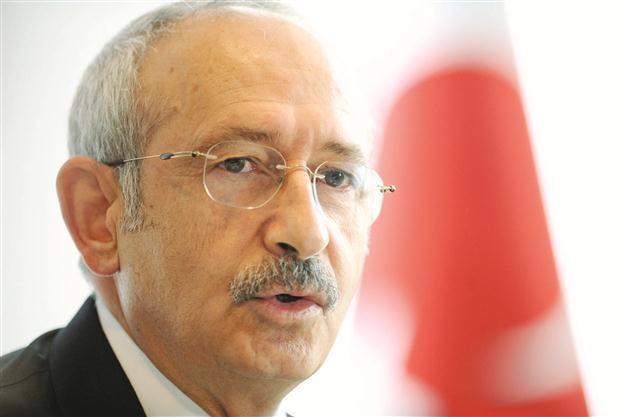CHP head lashes out at Russian gas accord
ANKARA – Hürriyet Daily News

A recent gas agreement makes Turkey much more dependent on Russia, the main opposition People’s Republican Party (CHP) leader Kemal Kılıçdaroğlu says. DAILY NEWS photo, Selahattin SÖNMEZ
Allowing Russia to construct a pipeline on Turkish territory to transport huge volumes of natural gas to European markets contradicts Ankara’s interests and will destroy the country’s plans to become a regional energy hub, the main opposition leader has said.
“We shot ourselves in the foot. We have presented Turkey to Russia as a New Year’s turkey,” Kemal Kılıçdaroğlu, leader of the Republican People’s Party (CHP), told Ankara bureau chiefs Dec. 30 in a meeting where he evaluated political developments in 2011.
“We let Russia use our territorial waters without receiving anything. That also means both Azerbaijani and Turkmen natural gas will also flow through this pipeline to Europe, which means killing the Nabucco project and our ambition to become a regional energy hub,” he said.
Turkey and Russia signed a deal Dec. 29 in Moscow allowing Russia’s Gazprom to build the South Stream Pipeline to carry natural gas to European markets through Turkish territorial waters in the Black Sea. In return, Russia made a discount on the cost of the natural gas Turkey is buying from Gazprom.
Earlier this year, the government had canceled a natural gas deal with Russia but asked the private sector to make agreements instead. However, no Turkish company was interested in buying and distributing gas under the proposed conditions.
“For how long is this reduction valid for? One year, three years?” asked Kılıçdaroğlu, adding that the deal was canceled by the government in order to allow pro-government companies to take the financial advantage.
“This made us much more dependent on Russia gas. Is this your ‘strategic depth?’” Kılıçdaroğlu said, referring to Foreign Minister Ahmet Davutoğlu’s famous book “Strategic Depth.”
Iran’s rise in region a product of AKP’s policies
Kılıçdaroğlu also slammed the government’s foreign policy, expressing concerns that Tehran will further increase its influence both in the Middle East and in the eastern Mediterranean due to Davutoğlu’s miscalculations.
“Iran is not only getting strong in Iraq and Syria, but also in our regional countries. It’s getting stronger on the basis of religion,” Kılıçdaroğlu said. “We have also opened the eastern Mediterranean to the influence of Iran.”
Drawing attention to the fact that Iran could supply weapons to its regional ally Syria via Iraq and would not hesitate to hit NATO’s early warning radar system deployed in the East Anatolian province of Malatya, the CHP urged the government to carefully analyze the developments for Turkey’s security and stability.
“If these policies are maintained, we will find ourselves in isolation. None of the regional countries want to see Turkey as ‘the big brother.’ A number of ambassadors told me this in person,” he said.
The policies Turkey pursued during the Arab Spring were also subject to Kılıçdaroğlu’s criticisms. “We failed to pass the class with our performance on the Arab Spring,” he said, adding that the party would hold a conference in the coming months with the participation of leftist and socialist parties from Arab countries.
2011 marks democratic decline
For Kılıçdaroğlu, the year 2011 marked an important decline in the democratic standards of Turkey due to the government’s oppressive treatment of dissent.
“We are facing such an oppressive regime that universities, trade unions, businessmen and citizens are afraid of expressing their opinions with regard to the new charter. People are afraid of talking on the phone due to growing wiretapping,” he said. “Everybody is aware of this fact but these concerns should be overcome. We want 2012 to be the year of democracy and freedoms.”
Kılıçdaroğlu also said the international media was describing Turkish democracy as a hybrid to draw attention to the contradiction. “As a country with 90 years of parliamentary experience, it’s not good to be depicted as a hybrid democracy,” he added.
